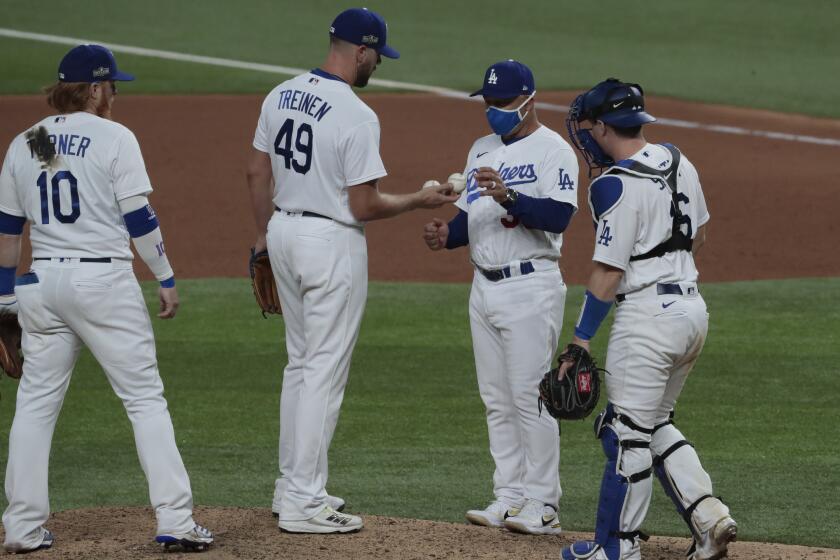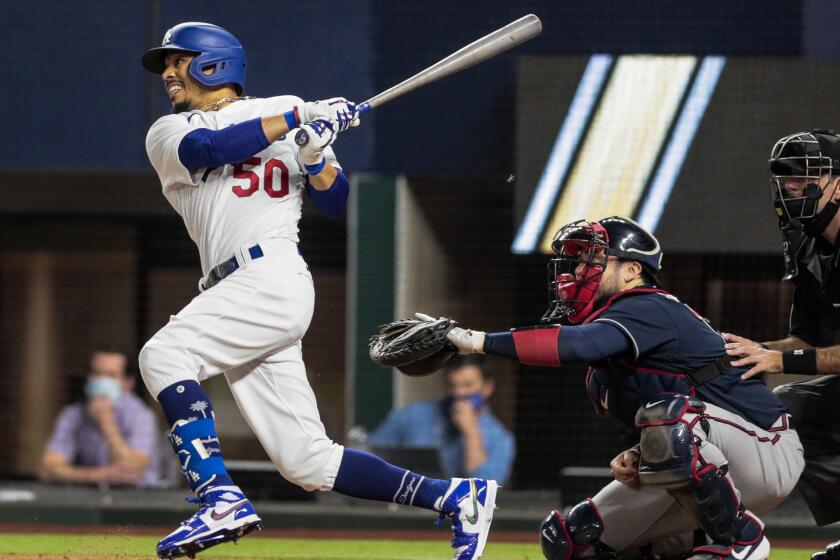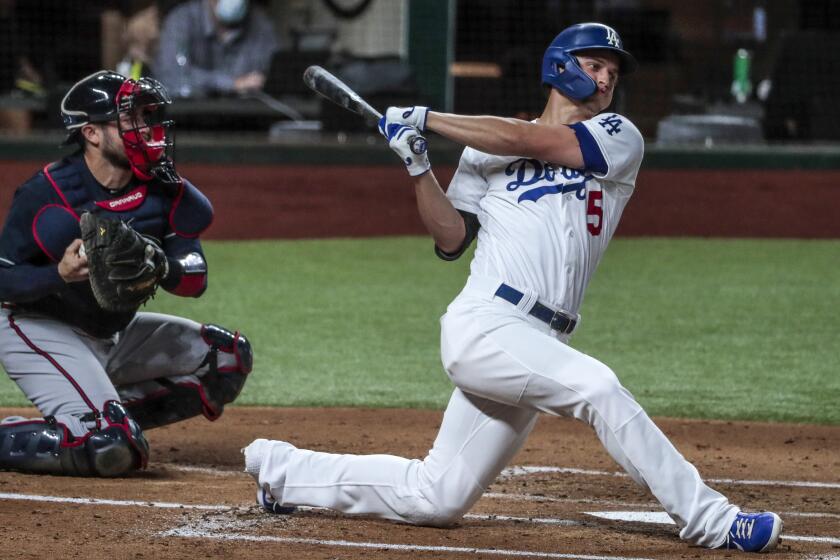Dodgers resurrect their October tradition of feeble offense in loss to Braves
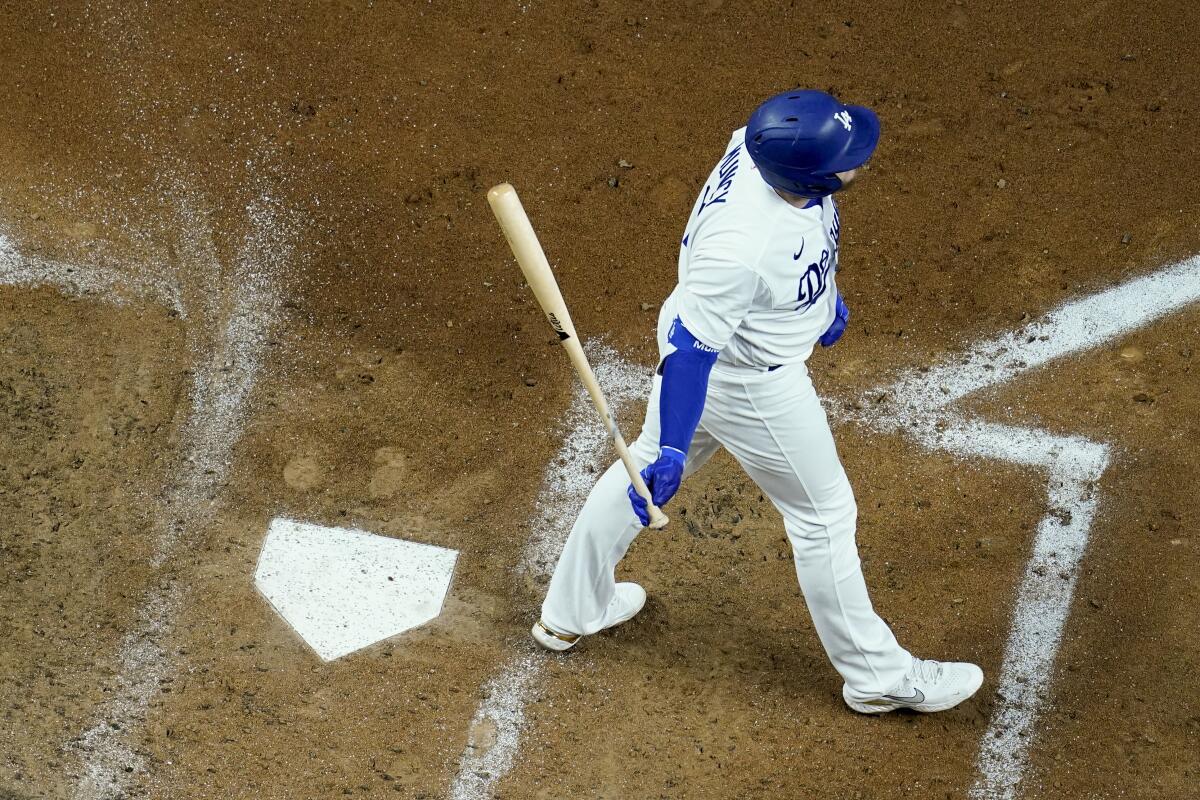
- Share via
In these most unusual of times, the Dodgers still can be counted on to provide an element of normalcy.
Everything about their 5-1 loss to the Atlanta Braves in Game 1 of the National League Championship Series on Monday night was familiar, from the successive zeros they posted on the scoreboard at Globe Life Field in Arlington, Texas, to the blank stares of the players along the dugout railing.
Once again, their offense vanished.
“We came up short because we didn’t put at-bats together and we didn’t get runners on base and we weren’t able to pass the baton like we did in the last series,” second baseman Kiké Hernández said.
The Dodgers collected only four hits, including a fifth-inning home run by Hernández that accounted for their only run. They drew two walks.
And that was the entirety of their offense.
The Dodgers’ bullpen implodes in the ninth inning in a 5-1 loss to the Atlanta Braves in Game 1 of the National League Championship Series.
Over the last four innings, they didn’t have a single player reach base.
Like trick-or-treating or bobbing for apples, the disappearance of their high-powered lineup has become an October tradition.
Unlike the Halloween-related activities that figure to be canceled this year, the Dodgers’ custom is evidently pandemic-proof.
A more frightening possibility was introduced Monday night, which is that not even Mookie Betts can inspire them to skip their annual hibernation.
The story they told themselves was that Betts’ multi-dimensional game wouldn’t ever let them look as feeble as they did against the Braves.
In reality, the Dodgers remain an unknown quantity.
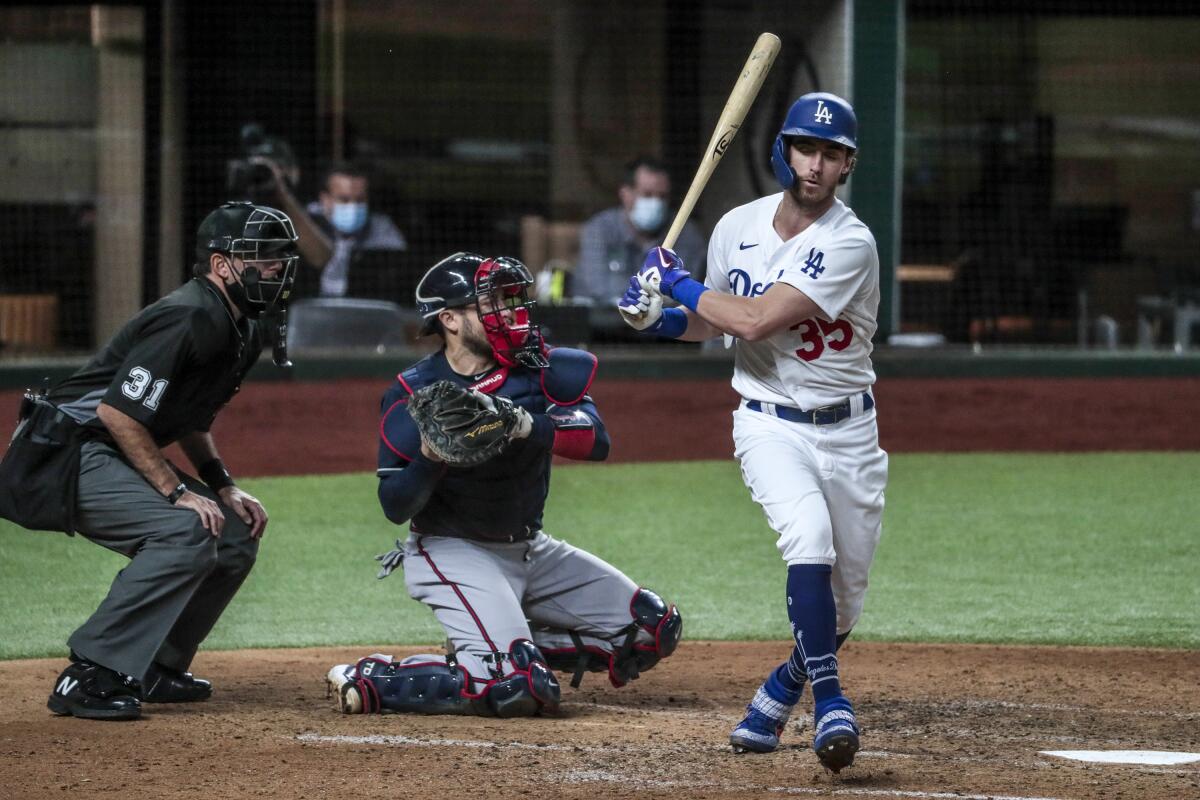
They aren’t alone. The regionalized schedule of the COVID-19 pandemic-shortened season limited the quality of pitching they encountered in the regular season.
The first two rounds of the playoffs didn’t test them either.
The Milwaukee Brewers, whom they swept in two games in the wild card round, were probably the worst team to ever reach the postseason. Their dominance over the Brewers masked an underwhelming offensive performance.
Taking advantage of the San Diego Padres’ top two pitchers being injured, the Dodgers developed an offensive rhythm in their NL Division Series. They hit only one home run in the three-game sweep but scored 23 runs, evidence backing their claim of the former feast-or-famine lineup’s newfound ability to manufacture runs.
When the playoffs began in earnest Monday night, the Dodgers’ lineup reverted to its form in the wild card round — or previous Octobers.
Except this time, their opponents didn’t self-destruct the way the overwhelmed Brewers did.

The Braves shut down Betts — and, by extension, shut down the Dodgers.
Betts batted only .185 against left-handers in the regular season, and Braves manager Brian Snitker made certain he faced only left-handers in Game 1.
Betts had three at-bats against starter Max Fried and one against All-Star setup man Will Smith. He went 0 for 4.
Mindful of the Braves’ shortage of starting pitching, as well as the absence of days off during this best-of-seven series, the Dodgers made it a point to run up Fried’s pitch count.
At first, they succeeded.
They stranded two runners in the first inning but forced Fried to throw 28 pitches. They stranded two more runners in the second inning but elevated his pitch count to 45.
Little did they know they wouldn’t have another runner in scoring position again.
Or that they wouldn’t be able to maintain their approach.
Mookie Betts has struggled against left-handed pitching this season, as seen in Game 1 vs. the Braves. Dodgers manager Dave Roberts isn’t concerned.
Leading off the third inning, Corey Seager became the first Dodgers hitter to swing at the first pitch, which, in retrospect, was a sign of what was to come.
The Dodgers started chasing pitches out of the strike zone. Their at-bats became shorter.
“The first two innings, we did a really nice job and then, the second time through [the lineup], we got a little bit out of our game,” Dodgers manager Dave Roberts said.
What initially looked like a short night for Fried turned into a six-inning start in which he struck out nine.
“To his credit,” Roberts said, “he just kept nibbling and spinning us to death.”
Fried threw a perfect sixth inning, which was followed by 1-2-3 innings by relievers Chris Martin, Smith and Mark Melancon.
The Braves’ only notable mistake was to Hernández, a curveball Fried threw over the middle of the plate.
But Roberts was convinced there were others.
Photos from Game 1 of the National League Championship Series between the Dodgers and the Atlanta Braves at Globe Life Field in Arlington, Texas.
“They made some mistakes we just didn’t capitalize on,” Roberts said.
The Dodgers won’t have to face Fried for at least a few more games.
And after they take on dominant rookie Ian Anderson in Game 2 on Tuesday, the quality of pitchers they will see will drastically diminish.
They have to regain their discipline. They have to start scoring again. If they don’t, they will partake in another painful tradition, adding to the number of years that have passed since Orel Hershiser was lifted into the air by Rick Dempsey.
Hernández reported from Los Angeles.
More to Read
Are you a true-blue fan?
Get our Dodgers Dugout newsletter for insights, news and much more.
You may occasionally receive promotional content from the Los Angeles Times.

